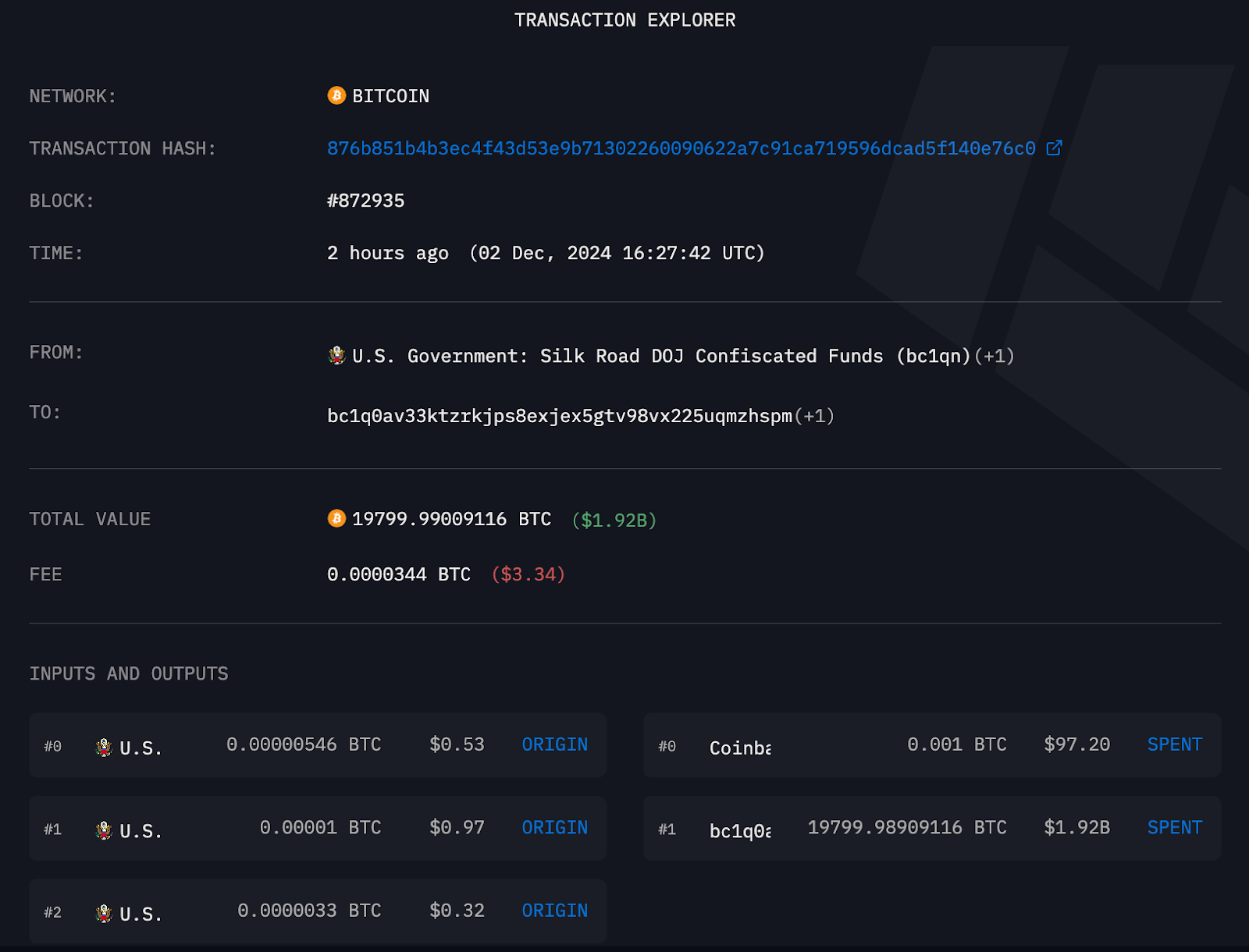On December 2, a wallet linked to the U.S. government transferred approximately 19,800 bitcoins worth $1.9 billion to a Coinbase Prime deposit address.

U.S. authorities seized these Bitcoins during a 2021 investigation involving James Zhong, who was later convicted of wire fraud tied to the Silk Road marketplace.
In 2022, the U.S. Department of Justice revealed that it had confiscated over 50,000 BTC from Zhong, including coins stashed in a wallet found 'on a single-board computer that was submerged under blankets in a popcorn tin.'
Bitcoin transfers raise questions
This transfer led many to speculate that the U.S. government is preparing for a gradual sale of its Bitcoin holdings, as it has done in the past. The crypto community, of course, was quick to criticize the move as yet another incomprehensible decision by the government.
“There’s no price at which it would make sense for the U.S. to sell any bitcoin under its control,” said Jason Lowery, a U.S. Space Force major and author of *Softwar: A Novel Theory on Power Projection and the National Strategic Significance of Bitcoin*, on December 3.
Coinbase CEO Brian Armstrong echoed Lowery’s post, agreeing that the U.S. government should hold onto its Bitcoin stash.
Agreed - the U.S. government should never sell Bitcoin IMO. https://t.co/FYRUh0wp1T
— Brian Armstrong (@brian_armstrong) December 2, 2024
Crypto educator Toby Cunningham was less diplomatic in his critique, saying, “If they’re dumb enough to sell (and let’s be honest, governments are dumb), that stash will be eaten up instantly.”
Relax. If they are dumb enough to sell (which we all know governments are dumb) then that supply will get eaten up instantly.
— Toby Cunningham (@sircryptotips) December 2, 2024
But here’s the weird thing: the CEO of Coinbase doesn't know the intent behind the obscene amount of Bitcoin being transferred to his exchange. Something smells off here. Adding to the intrigue, a separate camp of observers firmly believes the government has no intention of selling these bitcoins, and their arguments are surprisingly compelling.
Sale or Strategy?
So far this year, the U.S. government has transferred a total of 25,999 BTC worth roughly $2.49 billion to Coinbase. However, these transfers might be more about storage than sales.
Tether strategy advisor Gabor Gurbacs assumed that the U.S. government could simply consolidate wallets or update old addresses.
Regarding the recent U.S. Government Silk Road Bitcoin transfers: There is a chance that the USG is consolidating wallets or upgrading old addresses. There is also a lot we don't know. It's not guaranteed they will sell. I haven't seen any official auction information yet.
— Gabor Gurbacs (@gaborgurbacs) December 2, 2024
The U.S. Marshals Service, the federal agency responsible for seizing cryptocurrencies and other assets tied to criminal activity, announced in July that it would partner with Coinbase Prime to store tokens linked to asset forfeitures.
In the United States, assets seized during criminal investigations, including digital assets like Bitcoin, are often liquidated via auctions or direct sales. The proceeds are typically used to fund government programs or compensate crime victims.
What should the market expect if the sale happens?
A gradual sale is the go-to strategy for avoiding market chaos. It is a common practice to avoid negative market impact: a massive release of BTC can indeed lead to a sudden price decline.
The recent transfer might be a preparation for future sales, mirroring the playbook used for bitcoins seized in the Silk Road case. While the government hasn’t officially announced plans to sell, moving the funds to institutional exchange is seen as a pretty loud hint.
In the short term, the crypto market might experience some volatility as traders grapple with the uncertainty of new Bitcoins entering circulation. However, government Bitcoin sales are hardly breaking news. Historically, their impact has been fairly controlled, thanks to the authorities’ careful, strategic planning.

Disclaimer: All materials on this site are for informational purposes only. None of the material should be interpreted as investment advice. Please note that despite the nature of much of the material created and hosted on this website, HODL FM is not a financial reference resource and the opinions of authors and other contributors are their own and should not be taken as financial advice. If you require advice of this sort, HODL FM strongly recommends contacting a qualified industry professional.





